Items
Tag is exactly
isolation
-
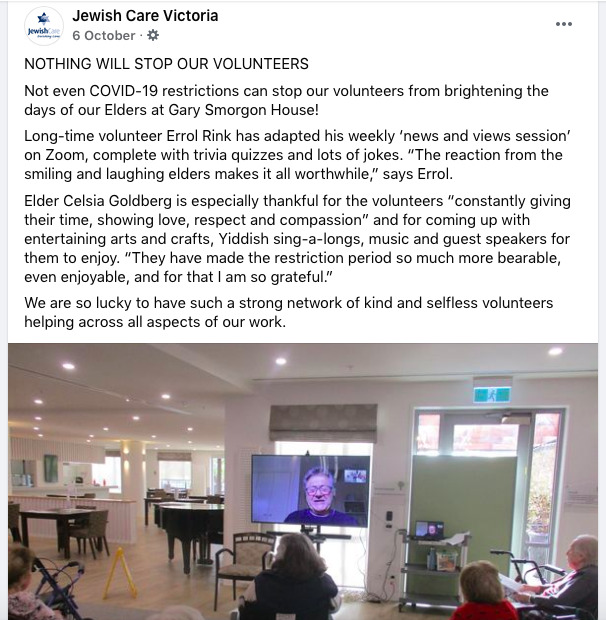 2020-10-06
2020-10-06Jewish Melbourne: Jewish Care virtual 'news and views' session with residents
"Not even COVID-19 restrictions can stop our volunteers from brightening the days of our Elders at Gary Smorgon House! Long-time volunteer Errol Rink has adapted his weekly ‘news and views session’ on Zoom, complete with trivia quizzes and lots of jokes. “The reaction from the smiling and laughing elders makes it all worthwhile,” says Errol. Elder Celsia Goldberg is especially thankful for the volunteers “constantly giving their time, showing love, respect and compassion” and for coming up with entertaining arts and crafts, Yiddish sing-a-longs, music and guest speakers for them to enjoy. “They have made the restriction period so much more bearable, even enjoyable, and for that I am so grateful.” We are so lucky to have such a strong network of kind and selfless volunteers helping across all aspects of our work." -
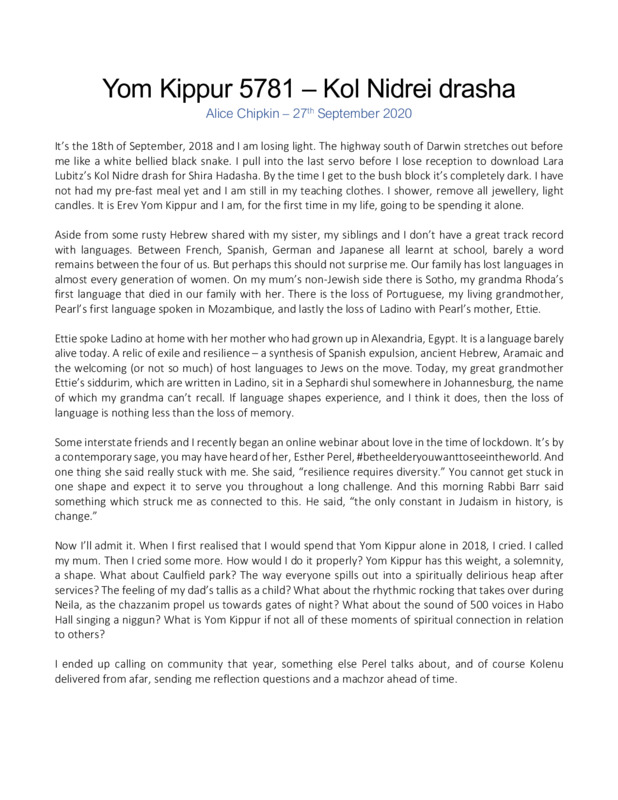 2020-09-27
2020-09-27Jewish Melbourne: Kehilat Kolenu Kol Nidre drash
Kehilat Kolenu ran services online for the High Holy Days, and shared the drash that was delivered by Alice Chipkin for Kol Nidre -
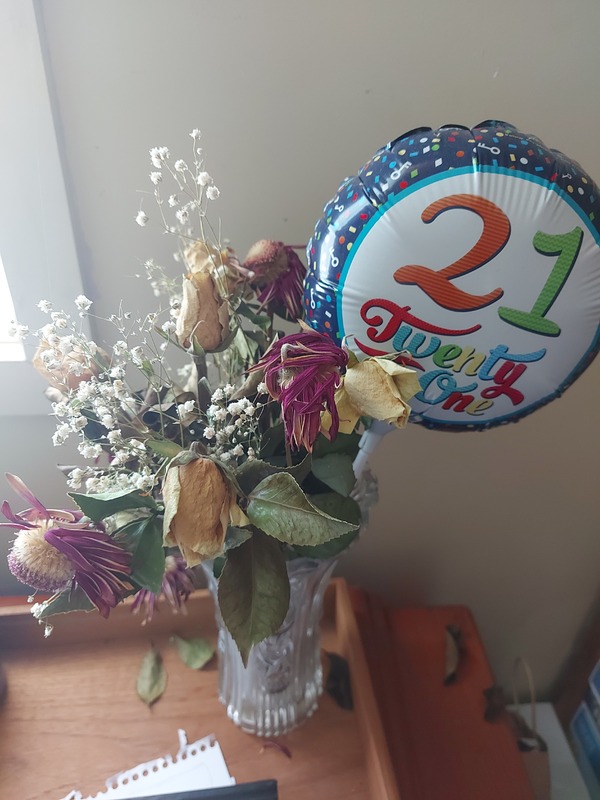 2020-11-04
2020-11-04Happy 21st
HIST30060 A person’s 21st birthday (whilst not as big a deal in Australia as other countries) is still considered an important milestone. I, like many other people in Melbourne, had the pleasure of experiencing my 21st birthday in lockdown. Friends were not invited. Family could not visit. Instead, I spent the day at home with only myself, my sister and my dog. I feel like this picture accurately represents what the time was like. Dead. Not literally, of course, but life had grinded to a halt during this period. And yet, that day was one of my happiest. Maybe because it gave an excuse for people to contact me. A theme I think runs through a lot of the pandemic. Because we could not meet physically, social interaction through technology became a lot more prevalent. And who doesn’t love being sent cupcakes? -
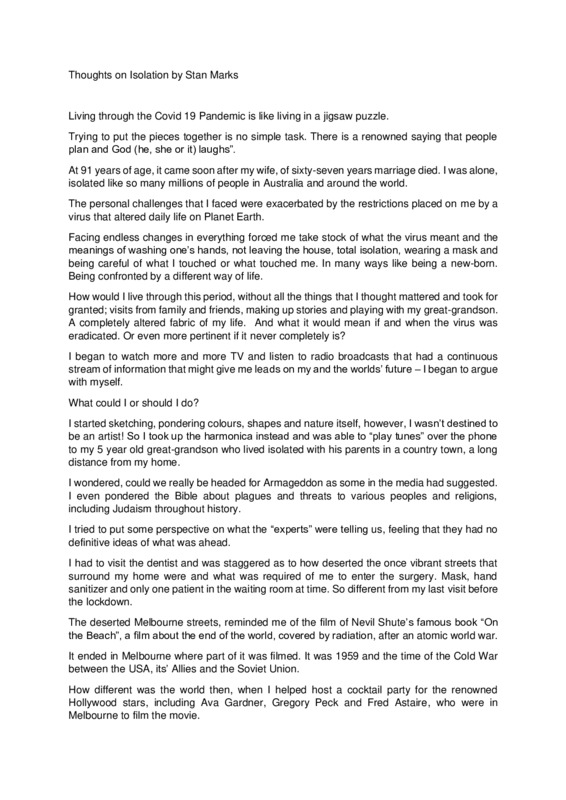 2020-10
2020-10Jewish Melbourne: 'Thoughts on Isolation' by Stan Marks
Stan Marks, who is 91 years old, reflects on living during the pandemic, and also shares a letter he wrote to share with the students in Year 12 at Brighton Grammar, his old school -
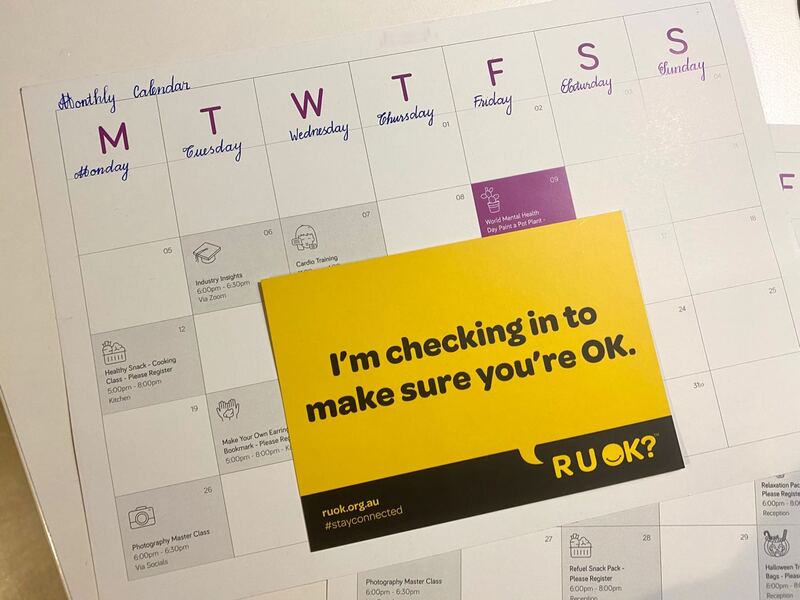 2020-10-28
2020-10-28‘I’m here for you’
2020 is a difficult year, especially for someone like me staying alone in foreign lands. What frustrated me was not only the difficulties in life, but also loneliness and lost. I have no roommate in Melbourne. Therefore, after the 5km travel ban was issued, I rarely contact with the outside world. Not only that, many of my friends choose to defer their studies and stayed in their mother country due to the plague so I gradually lost contact with them. In this case, speak to my classmates on the tutorial became almost the only way for me to communicate with the outside world. I am not ready to face this situation, and these sudden changes made me so depressed. Social distancing between men made me feel ignored and isolated, and I even considered about postponing my studies. Until a few days ago, I found some cards (as in the photo) from my apartment’s common zone. On the front page of the card there is ‘I’m here for you’, and residents could leave their contact information on the card to people who want to make new friends. I take one of the cards and left my message. Although I have not contacted that person so far, I can feel the kindness from strangers, and the support there makes me believe that everything will be fine. #HIST30060 -
2020-05-26
Reflections on staying at home with a child with special needs
As schools closed, a more unique kind of panic that kept me up at night during those first few weeks, being the mother of a child with special needs. -
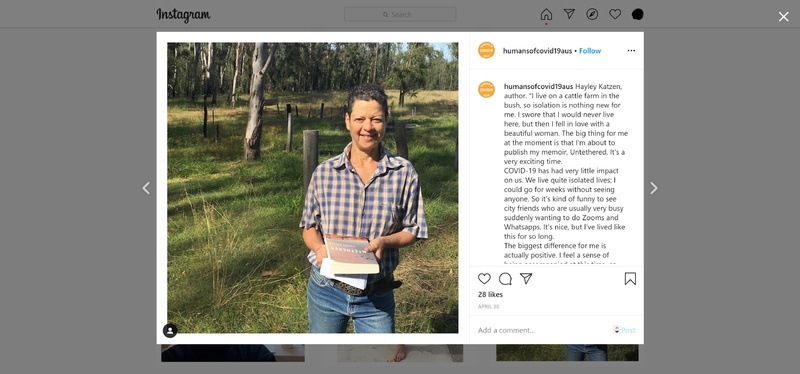 2020-04-30
2020-04-30Humans of Covid-19 AU: Hayley Katzen
“I live on a cattle farm in the bush, so isolation is nothing new for me. I swore that I would never live here, but then I fell in love with a beautiful woman. The big thing for me at the moment is that I'm about to publish my memoir, Untethered. It's a very exciting time. COVID-19 has had very little impact on us. We live quite isolated lives; I could go for weeks without seeing anyone. So it’s kind of funny to see city friends who are usually very busy suddenly wanting to do Zooms and Whatsapps. It’s nice, but I’ve lived like this for so long. The biggest difference for me is actually positive. I feel a sense of being accompanied at this time, as everyone is now living as I have been living. Often, over the years, I have felt quite lonely and struggled with the isolation, as do so many people. Now we are all in this. Adjusting to isolation is a deeply personal process. We all need to find what delights us and add it to our days. As I have compromised immunity, I have to wear a mask when going out. It feels very strange going to the supermarket and not being able to connect with anyone. I’ve been dealing with ovarian cancer treatment, so there is an uncertainty to my future. At this time, when the whole world is dealing with anxiety and uncertainty, there’s a universality to this shared experience. I find this intriguing at one level, and also feel incredibly lucky to be where I am. What most interests me is what we will put back into the world after this. My life won't change significantly. But in terms of our fragile planet, what will people do to take care of it?” Instagram post on Hayley Katzen, author, and their experience during the pandemic, which was created by a psychology student living in Melbourne who was interested to hear about how COVID-19 was impacting on different peoples’ lives. -
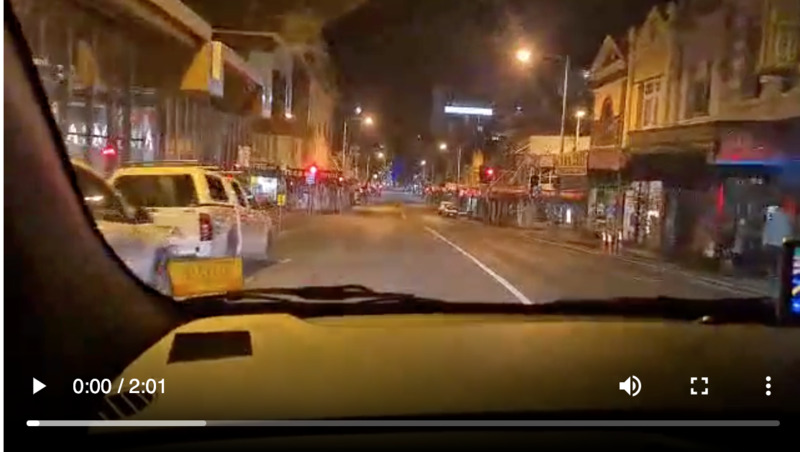 2020-04-17T19:30
2020-04-17T19:30Isolation and Illumination
I included this video because in my own time practicing social distancing and social isolation, I noticed that my days and nights became dominated by two distinctive scenes, which is a rather harsh contrast to the variety of settings available to me normally. The first being the windows to freedom I had driving in the car to and from the grocery store, or occasionally to go through the drive through. The second is my home, or more specifically the bedroom from within which I have to sleep, study, eat and entertain myself. Whilst I had access to several peripheral liminal zones between these two, such as the balcony outside my bedroom and my local walking track when walking my dog. The neon lights and empty spaces of the outside world through the car window, or through the layer of social distancing in the grocery store exemplify so much of the feeling I have experienced in isolation. I can’t quite pin down this feeling with a pithy phrase yet, but I found that the physical confinement to settings which became routine was so much more traumatising than the lack of social connection which was for me almost an over surplus rather than a lack as I am constantly surrounded by family with both my mother, brother and occasionally cousin being confined to a small cottage house. I feel like the whole world became this strange liminal space in which daily communal expectations were suspended without being overturned with new expectations, I never really got the sense of ‘the new normal’ that others have mentioned. -
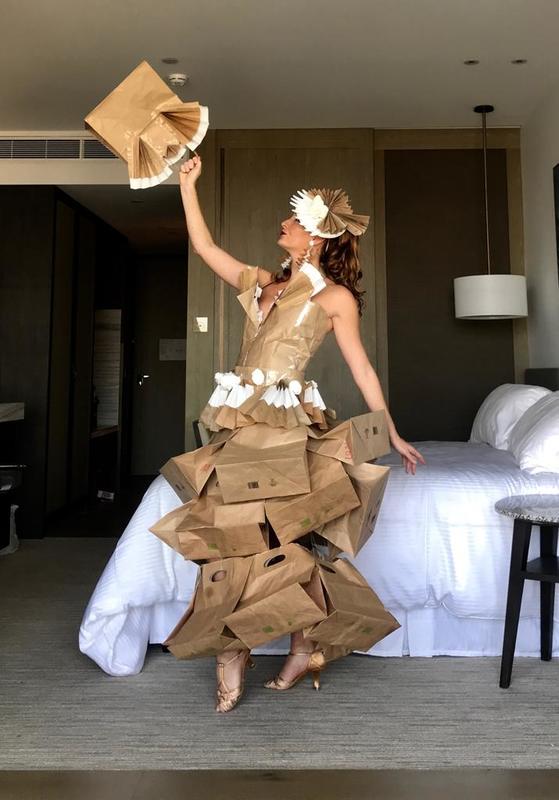 2020-05-28
2020-05-28Paper Bag Extravaganza (creativity in quarantine)
I was working as a dancer on the Cruise Ship MS Zaandam when the Covid-19 Pandemic hit. Countries began to close their borders and passengers and crew began presenting with flu-like symptoms. The entire ship went into lockdown to prevent the spread of this illness which was later confirmed to be Covid-19. We were denied entry to Chile, Peru and the Panama Canal. At this time we had 4 deaths onboard. The MS Rotterdam came to our aid with medical staff, test kits and supplies. Eventually we were granted entry through the Panama Canal to disembark passengers and sick crew in Florida. The ship then left port and sailed to the Bahamas were all crew had to undergo a 14 day CDC ordered quarantine. Repatriation plans were made and I was transferred to the Nieuw Statendam and sailed across the Atlantic to disembark in Rotterdam on May 13th. This ended up being a total of 60 days stranded at sea. After flying home to Perth I faced another 14 days away from family in mandatory Hotel Isolation . We were delivered meals 3 times a day that came in paper bags and other biodegradable containers. I wanted to do something creative and a little bit quirky to pass the time. This packaging became my inspiration to create a range of outfits constructed from these recycled materials. I posted a video of these creations and it went viral on Facebook. I have kept these costumes as memorabilia. -
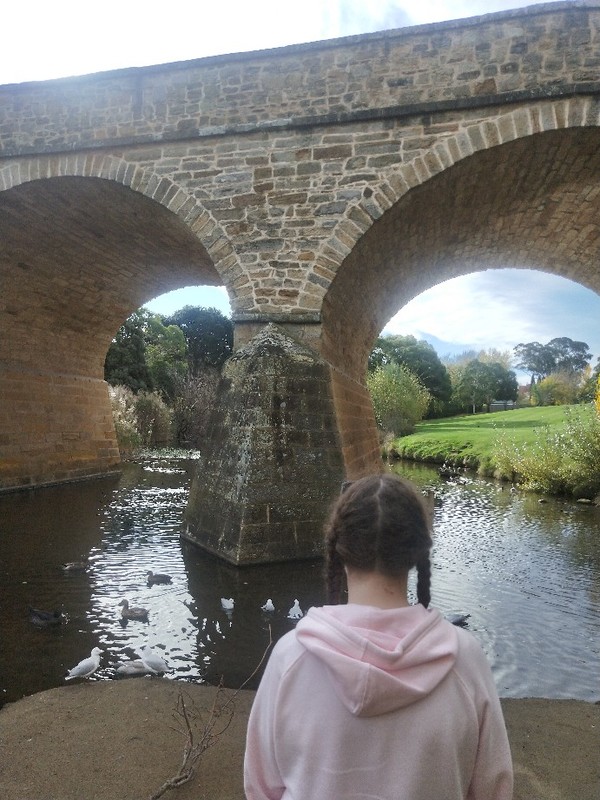 2020-05-14
2020-05-14The First Day Out
This was taken on the first occasion that I left my hometown in almost two months of isolation. My partner and I went to Richmond, a town only ten minutes from my house and very familiar, but the act of leaving was peculiar after so long sequestered. The Richmond Bridge, featured in the image, is the oldest of its kind in Australia, a piece of convict heritage that has stood the test of time. Some of my earliest memories feature the bridge and its surrounds, and returning to that place at the beginning of a post-COVID-19 existence was a peculiar sensation. For me, it will now have dual historical implications, as a relic of the nineteenth century, and of the plague year. -
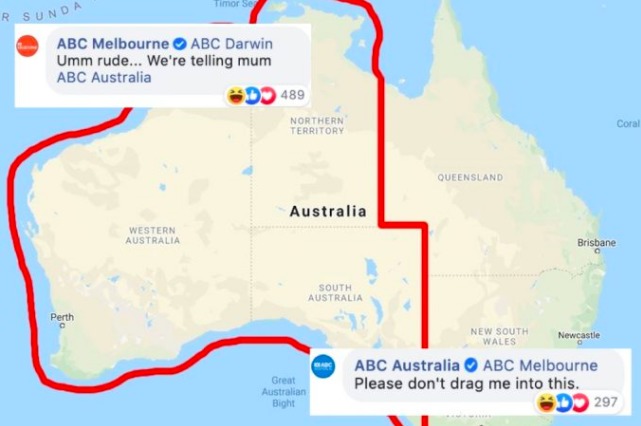 05/12/2020
05/12/2020State ABC's fight it out on Facebook
HUM402 Last week ABC Darwin asked on Facebook: "How do you feel about a travel bubble for the NT, Western Australia and South Australia?" Unexpectedly, the ABC pages for the various Australian states responded and the comments erupted into a hilarious "fight" between them all. -
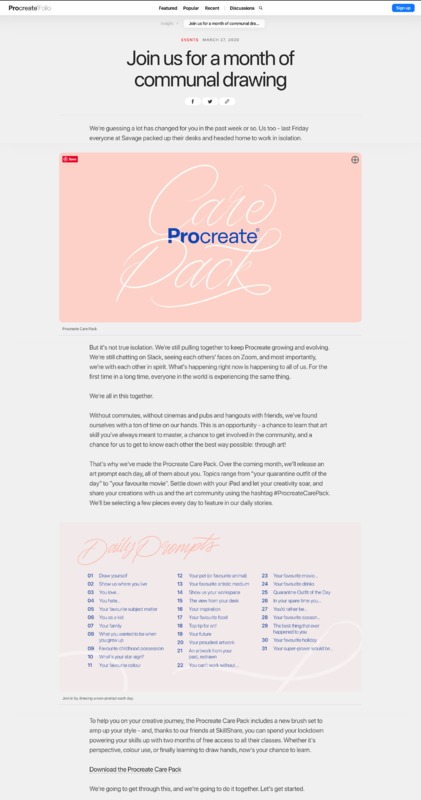 2020-03-27
2020-03-27Procreate Care Pack
Procreate is the bestselling iPad app for artists. When lockdown began in Australia, they launched a month-long campaign to encourage people to draw every day, and share their artwork with the community. The idea behind the Procreate Care Pack was to respond to the situation in a positive way, and keep people connected with one another through an isolating time. It resonated strongly with Procreate artists all over the world. -
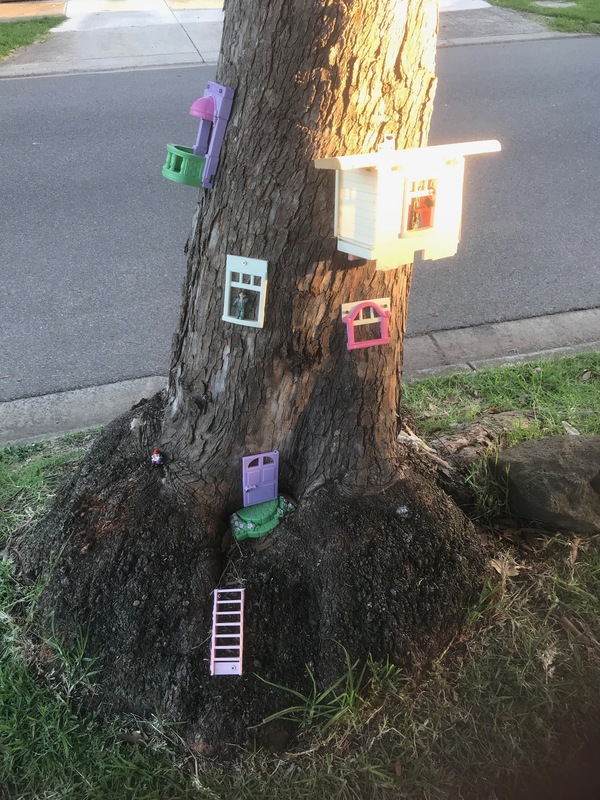 2020-04-24
2020-04-24Street as playground
With social distancing in place and stay-at-home rules, kids are playing more in the street right outside their own properties. -
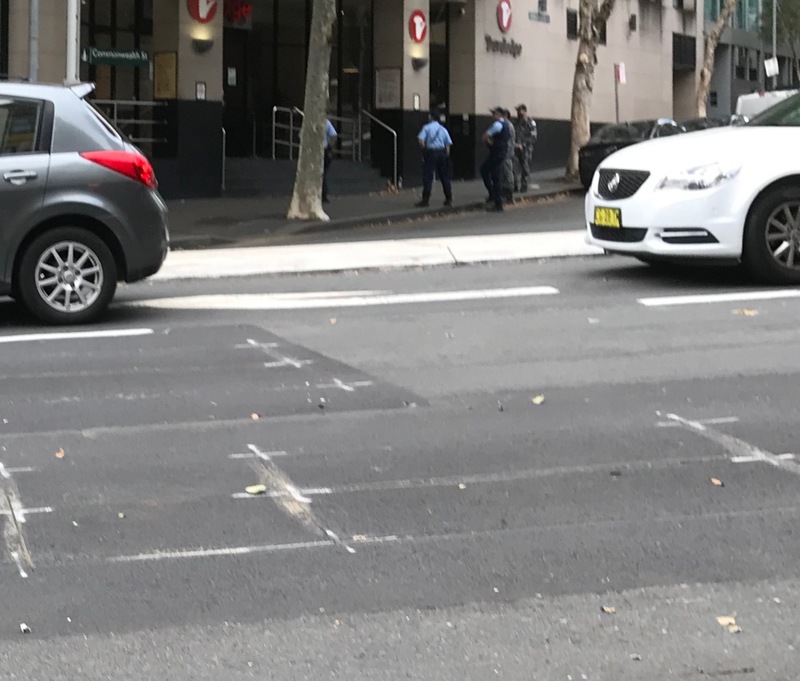 2020-04-06
2020-04-06Guarding the Travelodge
Police and Military personnel guard the Travelodge Hotel in Surry Hills, NSW, Australia. At the start of the lockdown due to COVID19, travellers returning to Australia were subject to mandatory quarantine for 14 days and were assigned hotels. They were isolated in rooms and police and army personnel guarded the premises around the clock. -
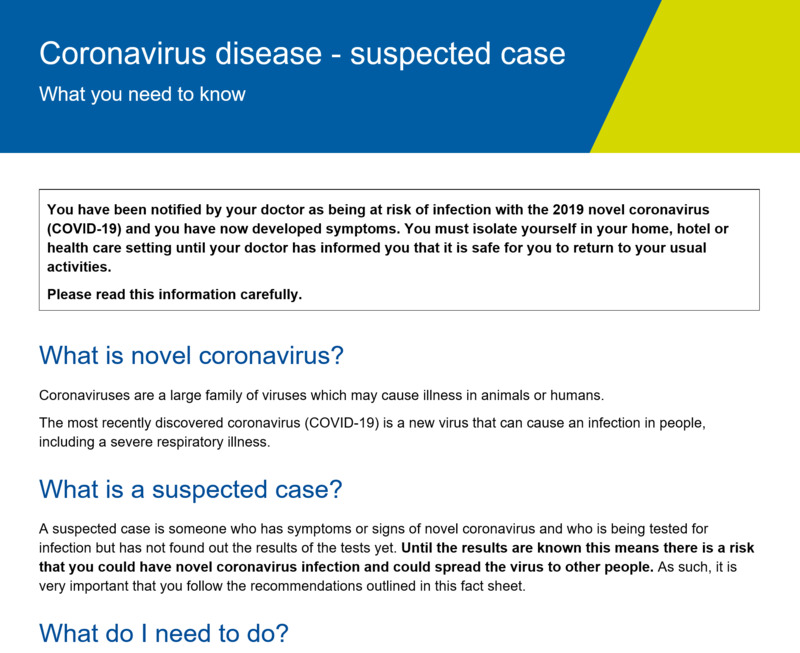 2020-02
2020-02Victorian State Government "Suspected Case" fact sheet
Government fact sheet for people who have been notified by their doctor as being at risk of infection and have now developed symptoms. You have been notified by your doctor as being at risk of infection with the 2019 novel coronavirus (COVID-19) and you have now developed symptoms. You must isolate yourself in your home, hotel or health care setting until your doctor has informed you that it is safe for you to return to your usual activities. Please read this information carefully. What is novel coronavirus? Coronaviruses are a large family of viruses which may cause illness in animals or humans. The most recently discovered coronavirus (COVID-19) is a new virus that can cause an infection in people, including a severe respiratory illness. What is a suspected case? A suspected case is someone who has symptoms or signs of novel coronavirus and who is being tested for infection but has not found out the results of the tests yet. Until the results are known this means there is a risk that you could have novel coronavirus infection and could spread the virus to other people. As such, it is very important that you follow the recommendations outlined in this fact sheet. What do I need to do? Your doctor will arrange for you to be tested for the infection. It may take a few days for the test results to be returned. If your symptoms are serious you will need to remain in hospital isolated from other patients to prevent further spread of the virus. If your doctor says you are well enough to return home while you are waiting for your test results you will need to stay isolated and monitor your symptoms as described below. Stay at home or in your hotel room • Isolate yourself at home until you are advised of the results by your doctor. – You should not leave your house except to seek medical attention. – You should stay in a different room to other people as much as possible. Use a separate bathroom if available. – Wear a surgical face mask when you are in the same room as another person and when seeking medical care. – Do not go to work, school, university, work or attend public places or events. Do not use public transport or taxi services. • Where possible, get others such as friends or family, who are not required to be isolated, to get food or other necessities for you. • If you have difficulties getting food or necessities, call 1800 675 398 for support. • If you need a translator first call 131 450, then request the hotline on 1800 675 398. More information is available on our website: dhhs.vic.gov.au/novelcoronavirus • Please keep Triple Zero (000) for emergencies only. Going outside If you live in a private house, then it is safe for you to go outside into your garden, balcony or courtyard. If you live in an apartment it is also safe for you to go outside into the garden while wearing a surgical mask. You should, however, go quickly through any common areas on the way to the garden. Wear a surgical mask if you have to move through these areas. Monitor your symptoms If your illness gets worse, you should call the doctor who cared for you or the emergency department where you were assessed. If it is a medical emergency (for example, shortness of breath at rest or difficulty breathing) you should: • Call 000 and request an ambulance • Inform the ambulance officers that you may have novel coronavirus, and they should take precautions. What happens if my test is negative? Your doctor or a Public Health Officer will advise you if you are can cease your isolation. If you were in self-isolation at the time you developed your symptoms, for example because you have been in contact with a confirmed case or travelled to China, you will need to continue isolation until the 14 days since last contact with the confirmed case or from your arrival in Australia. You should continue to carefully monitor your health for up to 14 days after your last contact with the confirmed case. Report any new or returning symptoms to your doctor in this period. You may be required to be tested again. You do not require medical clearance to return to work, university or school. If you have stayed in isolation and remain well, then they are safe to return to their usual activities. What happens if my test is positive? A Public Health Officer will contact you to find out more information from you and provide you with further information. You must remain in your home or accommodation until further tests are completed and you have become well. After a discussion, a specialist may be involved to further assess your illness. A Public Health Officer will conduct an assessment to advise when it is safe to return to normal activities. If your condition deteriorates, seek medical attention: • Notify the department or Public Health Officer managing your care by calling the number provided to you. • Follow the direction of the Public Health Officer who may advise you to go to a doctor or a hospital, and will agree with you how you should get there. • Call ahead to the doctor or hospital and inform them that you are a confirmed case of novel coronavirus. • If you need to leave your home or accommodation to seek medical attention, put on the mask provided to you. • When you arrive at the doctor’s surgery or hospital, tell them that you are a confirmed case of novel coronavirus. If you are experiencing severe symptoms, such as shortness of breath: • Call 000 and request an ambulance • Inform the ambulance officers that you have novel coronavirus. People who you have had close contact with including family members and people you live with will need to isolate themselves for 14 days since their last contact with you. Looking after your well-being during isolation Being confined to home for an extended period of time can cause stress and conflict. Tips for looking after yourself include: • Talk to the other members of the family about the infection. Understanding novel coronavirus will reduce anxiety. • Reassure young children using age-appropriate language. • Think about how you have coped with difficult situations in the past and reassure yourself that you will cope with this situation too. Remember that self-isolation won’t last for long. • Exercise regularly. Options could include exercise DVDs, dancing, floor exercises, yoga, walking around the backyard or using home exercise equipment, such as a stationary bicycle, if you have it. Exercise is a proven treatment for stress and depression. • Keep in touch with family members and friends via telephone, email or social media. • Keep up a normal daily routine as much as possible. • Arrange with your employer to work from home, if possible. • Ask your child’s school to supply assignments, work sheets and homework by post or email, or if the student can join the class using online options. • Don’t rely too heavily on the television and technology. Treat self-isolation as an opportunity to do some of those things you never usually have time for, such as board games, craft, drawing and reading. • If you are struggling to cope you call Lifeline on 13 11 14 or Beyond Blue on 1300 22 4636. Where can I find out more information? Call the Department of Health and Human Services on to discuss any questions you have. If you need a translator first call 131 450, then request the hotline on 1300 651 160. For Victorian updates to the current incident, go to: https://www.dhhs.vic.gov.au/novelcoronavirus For national updates: https://www.health.gov.au/news/latest-information-about-novel-coronavirus For international updates: https://www.who.int/westernpacific/emergencies/novel-coronavirus WHO resources https://www.who.int/health-topics/coronavirus -
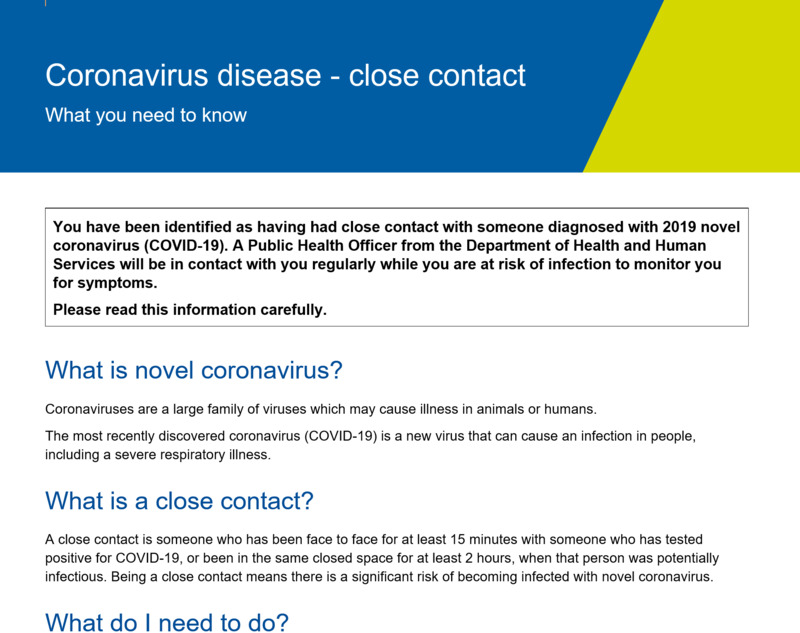 2020-02
2020-02Victorian State Government "Close Contact" fact sheet
Government fact sheet for people who "have been identified as having had close contact with someone diagnosed with 2019 novel coronavirus (COVID-19)", Version 1.3 You have been identified as having had close contact with someone diagnosed with 2019 novel coronavirus (COVID-19). A Public Health Officer from the Department of Health and Human Services will be in contact with you regularly while you are at risk of infection to monitor you for symptoms. Please read this information carefully. What is novel coronavirus? Coronaviruses are a large family of viruses which may cause illness in animals or humans. The most recently discovered coronavirus (COVID-19) is a new virus that can cause an infection in people, including a severe respiratory illness. What is a close contact? A close contact is someone who has been face to face for at least 15 minutes with someone who has tested positive for COVID-19, or been in the same closed space for at least 2 hours, when that person was potentially infectious. Being a close contact means there is a significant risk of becoming infected with novel coronavirus. What do I need to do? Stay at home or in your hotel room • Isolate yourself at home until 14 days after you were last exposed to the infectious person. – You should not leave your house except to seek medical attention. – You should stay in a different room to other people as much as possible. Use a separate bathroom if available. – Do not go to work, school, university, work or attend public places or events. Do not use public transport or taxi services. – Where possible, get others such as friends or family, who are not required to be isolated, to get food or other necessities for you. • If you have difficulties getting food or necessities, call 1800 675 398 for support. • If you need a translator first call 131 450, then request the hotline on 1800 675 398. More information is available on our website: dhhs.vic.gov.au/novelcoronavirus • Please keep Triple Zero (000) for emergencies only. Going outside If you live in a private house, then it is safe for you to go outside into your garden, balcony or courtyard. If you live in an apartment it is also safe for you to go outside into the garden while wearing a surgical mask. You should, however, go quickly through any common areas on the way to the garden. Wear a surgical mask if you have to move through these areas. Monitor your symptoms • Monitor your health until 14 days after you were last exposed to the infectious person. • Watch for any of these signs and symptoms: – fever – cough – shortness of breath • Other early symptoms can include chills, body aches, sore throat, headache, runny nose, muscle pain or diarrhoea. You will be contacted daily by a Public Health Officer to check whether you have had symptoms. What if I develop symptoms? If you develop any of the symptoms listed above: • Call a doctor or hospital and inform them that you have had contact with a confirmed case of novel coronavirus and you have symptoms. • Put on a mask if you have one. • Keep yourself away from others (for example, in a different room). • Do not go to work, school, university, work or attend public places or events. Do not use public transport or taxi services. • When you arrive at the general practice or hospital, tell them again that you are a contact of a confirmed case of novel coronavirus. Your doctor or staff at the hospital emergency department will ensure you are wearing a mask and take you through to a room away from others. The doctor will contact our department on 1300 651 160. They may organise to take nose and throat swabs to send for testing for the novel coronavirus. If you are experiencing severe symptoms, such as shortness of breath: • Call 000 and request an ambulance. • Inform the ambulance officers that you have been in close contact with a confirmed case of novel coronavirus. How can I prevent the spread of the virus? Practising good hand and sneeze/cough hygiene is the best defence: • Wash your hands often with soap and water before and after eating as well as after attending the toilet. • Avoid all contact with others. • Cough and sneeze into your elbow. Should I wear a face mask? Face masks are not recommended if you do not have symptoms. A facemask will not protect you against becoming infected. If you are ill, you should put on a mask if you have one to prevent spreading the infection to others. You will be given a mask to wear by your doctor. Looking after your well-being during isolation Being confined to home for an extended period of time can cause stress and conflict. Tips for looking after yourself include: • Talk to the other members of the family about the infection. Understanding novel coronavirus will reduce anxiety. • Reassure young children using age-appropriate language. • Think about how you have coped with difficult situations in the past and reassure yourself that you will cope with this situation too. Remember that self-isolation won’t last for long. • Exercise regularly. Options could include exercise DVDs, dancing, floor exercises, yoga, walking around the backyard or using home exercise equipment, such as a stationary bicycle, if you have it. Exercise is a proven treatment for stress. • Keep in touch with family members and friends via telephone, email or social media. • Keep up a normal daily routine as much as possible. • Arrange with your employer to work from home, if possible. • Ask your child’s school to supply assignments, work sheets and homework by post or email, or if the student can join the class using online options. • Don’t rely too heavily on the television and technology. Treat self-isolation as an opportunity to do some of those things you never usually have time for, such as board games, craft, drawing and reading. • If you are struggling to cope you call Lifeline on 13 11 14 or Beyond Blue on 1300 22 4636. Where can I find out more information? Call the Department of Health and Human Services on to discuss any questions you have. If you need a translator first call 131 450, then request the to be put through to the department on 1300 651 160. For Victorian updates to the current incident, go to: https://www.dhhs.vic.gov.au/novelcoronavirus For national updates: https://www.health.gov.au/news/latest-information-about-novel-coronavirus For international updates: https://www.who.int/westernpacific/emergencies/novel-coronavirus WHO resources https://www.who.int/health-topics/coronavirus -
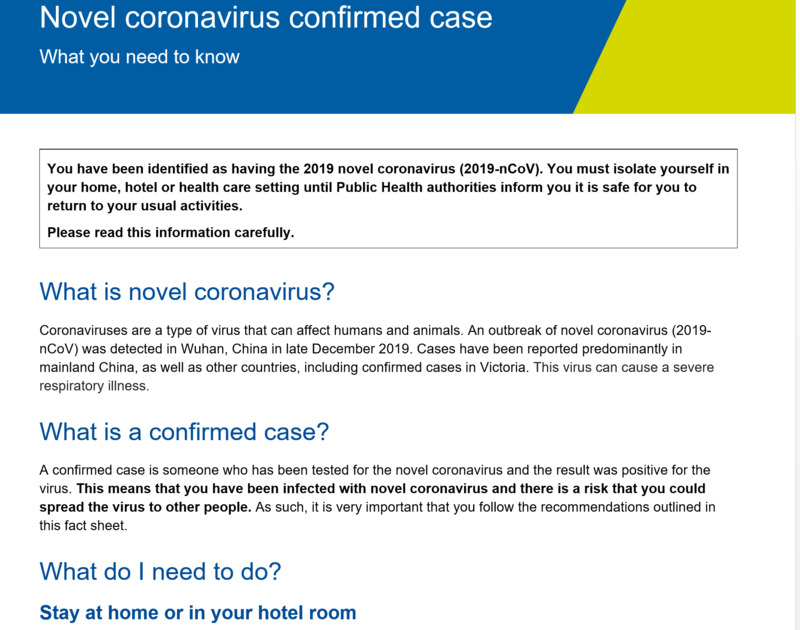 2020-02-11
2020-02-11Victorian State Government "Novel coronavirus confirmed case" fact sheet
Government advice to people who have "2019 novel coronavirus (2019-nCoV)". -
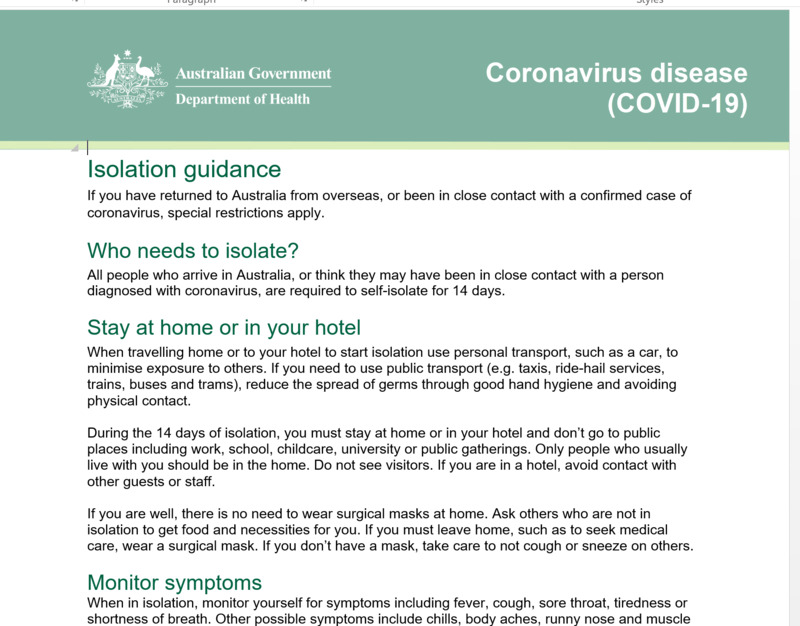 2020-03-23
2020-03-23Australian Government Isolation Guidance
Australian Government fact sheet with guidance on self-isolation, Version 14 Isolation guidance If you have returned to Australia from overseas, or been in close contact with a confirmed case of coronavirus, special restrictions apply. Who needs to isolate? All people who arrive in Australia, or think they may have been in close contact with a person diagnosed with coronavirus, are required to self-isolate for 14 days. Stay at home or in your hotel When travelling home or to your hotel to start isolation use personal transport, such as a car, to minimise exposure to others. If you need to use public transport (e.g. taxis, ride-hail services, trains, buses and trams), reduce the spread of germs through good hand hygiene and avoiding physical contact. During the 14 days of isolation, you must stay at home or in your hotel and don’t go to public places including work, school, childcare, university or public gatherings. Only people who usually live with you should be in the home. Do not see visitors. If you are in a hotel, avoid contact with other guests or staff. If you are well, there is no need to wear surgical masks at home. Ask others who are not in isolation to get food and necessities for you. If you must leave home, such as to seek medical care, wear a surgical mask. If you don’t have a mask, take care to not cough or sneeze on others. Monitor symptoms When in isolation, monitor yourself for symptoms including fever, cough, sore throat, tiredness or shortness of breath. Other possible symptoms include chills, body aches, runny nose and muscle pain. What do I do if I get sick? If you develop symptoms (fever, a cough, sore throat, tiredness or shortness of breath) within 14 days of returning to Australia, or within 14 days of last contact of a confirmed case, you should arrange to see a doctor for urgent assessment. You should telephone the health clinic or hospital before you arrive and tell them your travel history or that you have been in contact with a confirmed case of coronavirus. You must remain isolated either in your home, hotel or a healthcare setting until public health authorities inform you it is safe for you to return to your usual activities. How can I prevent the spread of coronavirus? Practising good hand and sneeze/cough hygiene and keeping your distance from others when you are sick is the best defence against most viruses. You should: • wash your hands frequently with soap and water, including before and after eating, and after going to the toilet • cover your cough and sneeze, dispose of tissues, and wash your hands • avoid contact with others (stay more than 1.5 metres from people) • stay at home if unwell. Going outside If you live in a private house, it is safe for you to go into your garden or courtyard. If you live in an apartment or are staying in a hotel, it is also safe for you to go into the garden but you should wear a surgical mask to minimise risk to others and move quickly through any common areas. Advice for others living with you Others that live with you are not required to be isolated unless they meet one of the isolation criteria outlined above. If you develop symptoms and are confirmed to have coronavirus, they will be classified as close contacts and will need to be isolated. Cleaning To minimise the spread of any germs you should regularly clean surfaces that are frequently touched such as door handles, light switches, kitchen and bathroom areas. Clean with household detergent or disinfectant. Managing the 14 day isolation Being in isolation can be stressful and boring. Suggestions include: • Keep in touch with family members and friends via telephone, email or social media. • Learn about coronavirus and talk with others. • Reassure young children using age-appropriate language. • Where possible, keep up normal daily routines, such as eating and exercise. • Arrange to work from home. • Ask your child’s school to supply assignments or homework by post or email. • Do things that help you relax and use isolation as an opportunity to do activities you don’t usually have time for. More information For the latest advice, information and resources, go to www.health.gov.au Call the National Coronavirus Helpline on 1800 020 080. It operates 24 hours a day, seven days a week. If you require translating or interpreting services, call 131 450. The phone number of your state or territory public health agency is available at www.health.gov.au/state-territory-contacts If you have concerns about your health, speak to your doctor. -
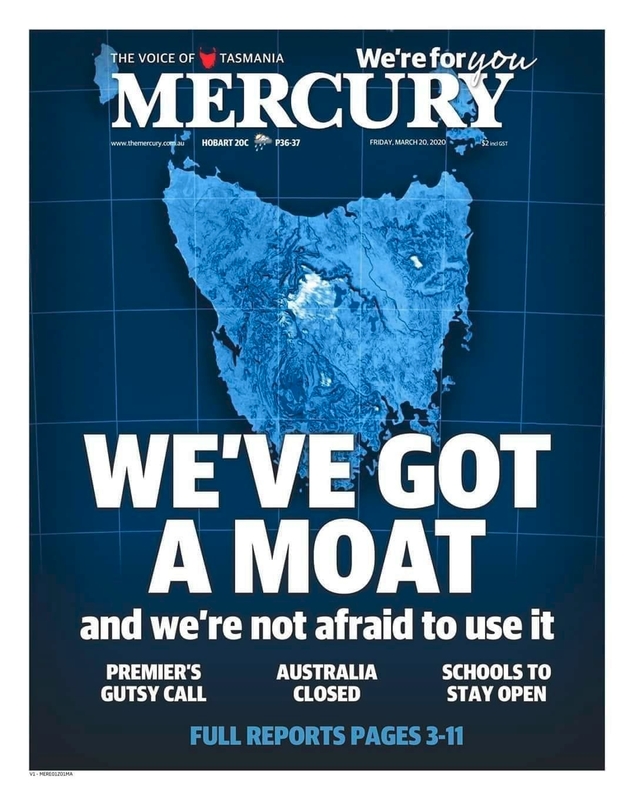 2020-03-20
2020-03-20#behindthemoat
This captures the island nature of Tasmania - Australian but not. I saw it the first day of a 14 day travel related isolation, a moat within a moat -
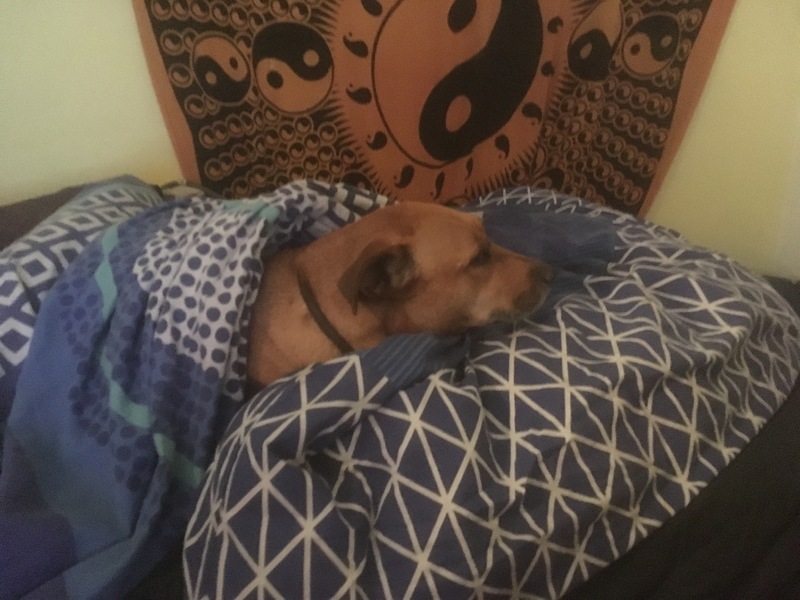 2020-03-24
2020-03-24My new coworker is a bit of a bitch.
The challenges of working from home. -
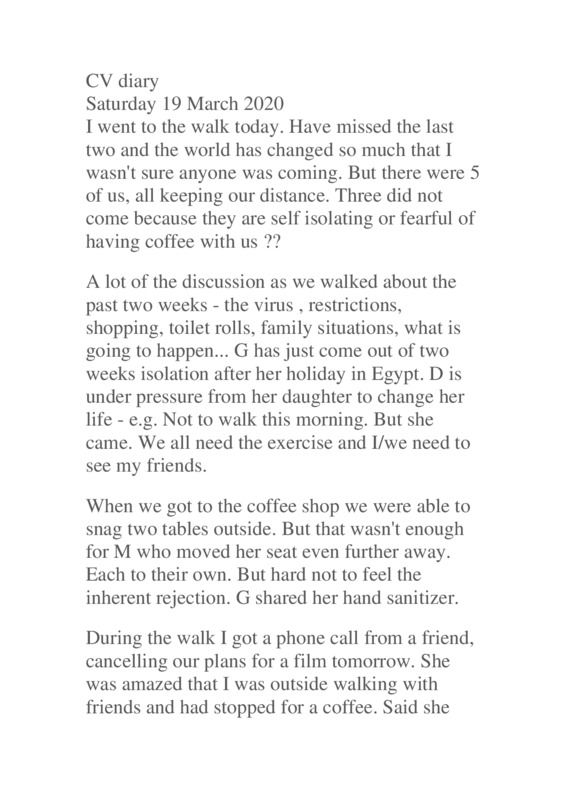 2020-03-21
2020-03-21Diary LM
CV diary Saturday 19 March 2020 I went to the walk today. Have missed the last two and the world has changed so much that I wasn't sure anyone was coming. But there were 5 of us, all keeping our distance. Three did not come because they are self isolating or fearful of having coffee with us ?? A lot of the discussion as we walked about the past two weeks - the virus , restrictions, shopping, toilet rolls, family situations, what is going to happen... G has just come out of two weeks isolation after her holiday in Egypt. D is under pressure from her daughter to change her life - e.g. Not to walk this morning. But she came. We all need the exercise and I/we need to see my friends. When we got to the coffee shop we were able to snag two tables outside. But that wasn't enough for M who moved her seat even further away. Each to their own. But hard not to feel the inherent rejection. G shared her hand sanitizer. During the walk I got a phone call from a friend, cancelling our plans for a film tomorrow. She was amazed that I was outside walking with friends and had stopped for a coffee. Said she and her husband have been in isolation since last Sunday. Cautioned me to do the same. When I got home I thought about my plans. I will go to church tomorrow (it was confirmed late today that the Diocese has belatedly decided to ban all services from Monday). Should I go to the gym on Monday? They seemed well organised last week. Should I cancel my lunch with Susan on Tuesday? Have not seen her since her mother died, I could not go to the funeral or the wake. And she seems quite distressed and needs support. On Wednesday I am expected to present at an important Board presentation to Club members. It is being taped and uploaded to our website for those who cannot get to the meeting. Should I cancel everything after that? LM
